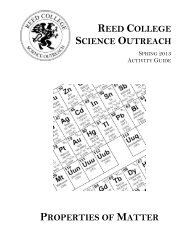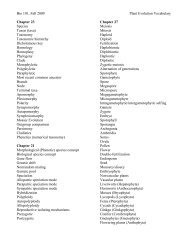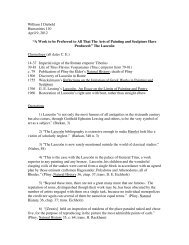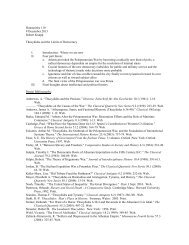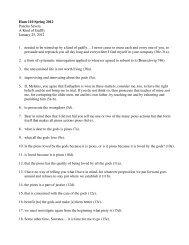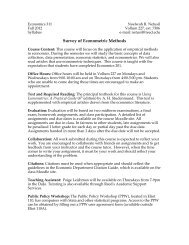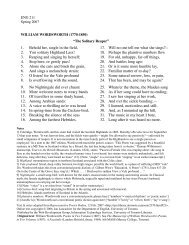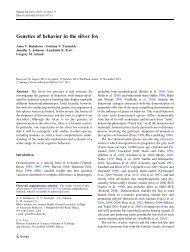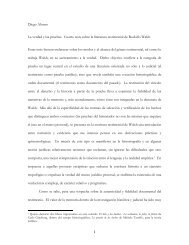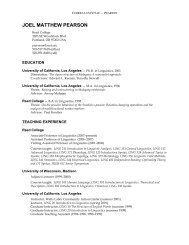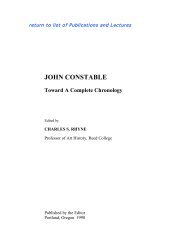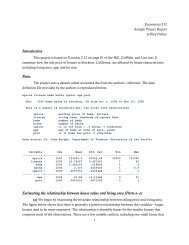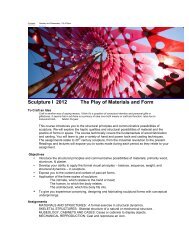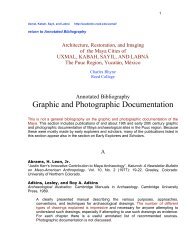The Promised Land - Reed College
The Promised Land - Reed College
The Promised Land - Reed College
You also want an ePaper? Increase the reach of your titles
YUMPU automatically turns print PDFs into web optimized ePapers that Google loves.
Page 6 of 8<br />
2. Documents from Family (Birth Certificates, Marriage Certificates, Immigration Papers, etc)<br />
3. Family Photos<br />
4. Family Tree<br />
For each of the three eras you cover, you should answer what it meant to be a(n America)Jew" (or an<br />
American of a different ethnic group) for your family.<br />
Expected Length: one paragraph to page per era. Three eras required. Date Due: Eelectronic (non web)<br />
Draft 2.5.04; Web Version Posted 2.16.04<br />
2. "MELTING POT," "ASSIMILATION WOES," "TESHUVA"<br />
ASSIGNMENTS<br />
A. PRIMARY TEXTS: ANNOTATION<br />
Overview: Compose a hypertext to explain one of the primary documents and to connect it to the other<br />
readings, theory, discussions, and classmates presentations. Your audience is other members of the class as<br />
well as friends who are interested in the class but were unable to take it this semester. (I.e. do not assume<br />
prior knowledge when you build the page.)<br />
Detailed Instructions: First, your group will need to agree on which primary text you would like to use (feel<br />
free to consult with me). Once you have determined the primary text, each person should choose a<br />
paragraph, illustration, or stanza to annotate as a hypertext. You may break this text down into sections,<br />
illustrate it with relevant visual images, or connect it to whatever other materials you deem useful. One goal<br />
of this hypertext is to provide other members of the class with information they would need to know in<br />
order to understand the primary text. You may want to include links to relevant allusions, other parts of the<br />
text, other primary texts we have studied, critical articles, prior postings by your classmates, or ideas<br />
covered in class discussion. Since your goal is to unpack these connections, you will need to explain your<br />
links so that outsiders will know why they are relevant and important. Your links should include two<br />
connections to other postings by your classmates (either from this section of the course, or from earlier<br />
ones). You may also include a brief introduction to the passage if you find that helpful. Your annotation<br />
should be posted on your WebPages and should be linked to on your group's WebPages at least 24 hours<br />
before you are schedule to lead discussion.<br />
Deadlines: This assignment is to be posted the night before your group is scheduled to lead discussion on<br />
the primary text for the "Melting Pot," "Assimilation Woes," or "Teshuva" sections of the syllabus. Note<br />
that this means that you will only do one of these annotations per semester. <strong>The</strong> purpose of this assignment<br />
is to provide the rest of the class with a close reading of an excerpt of the primary text.<br />
Evaluation: I will be asking both your groupmates and yourself to evaluate the pages based on (1) how well<br />
your page accomplish the assignment and (2) how well your page works as a webpage. You should feel free<br />
to make changes to your page and update it as you learn new tricks or think of new connections.<br />
B. CRITICAL ARTICLES: ANNOTATED BIBLIOGRAPHY ENTRIES<br />
<strong>The</strong> night before your group is scheduled to lead discussion on the critical articles for the "Melting Pot,"<br />
"Assimilation Woes," or "Teshuva" sections of the syllabus, you will be responsible for posting an annotated<br />
bibliography entry on a relevant critical article. See the "sample annotated bibliography" in the class reader<br />
for examples. At the top of the abstract should be the title of the article and the citation in MLA format.<br />
This abstract should be emailed to the class and posted on your WebPages at least 24 hours prior to the day<br />
to relate any experiences they have had with Jews or what they think makes an (American) Jew a "Jew." You may want<br />
to compare your interviewees ideas with your own views.



